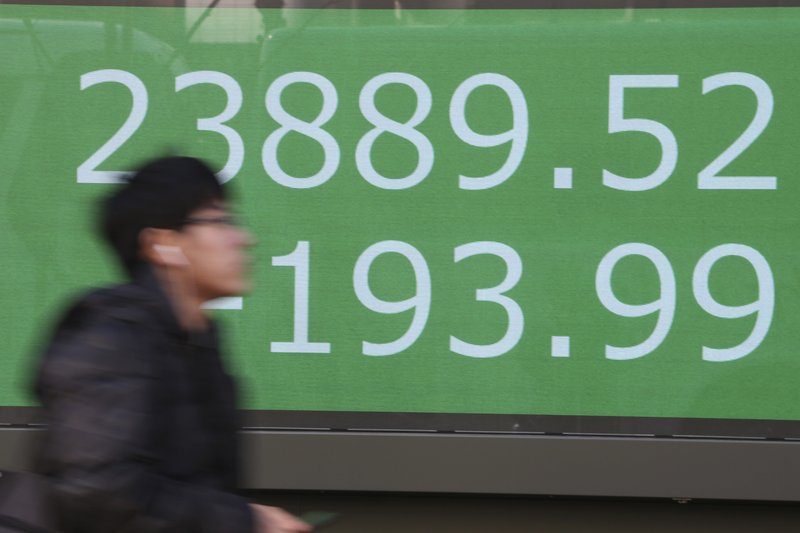Banks led a slide in U.S. stocks Tuesday as a virus outbreak in China rattled global markets, prompting investors to shift assets into bonds and defensive sector companies.
The sell-off snapped a three-day winning streak by the S&P 500. The benchmark index ended last week at an all-time high.
The selling in U.S. stocks followed losses in Asian and European markets as investors worried that the new coronavirus spreading in the world's second-largest economy could hurt tourism and ultimately economic growth and corporate profits.
Six people have died, and 291 have been infected in China, just as people in the country were preparing to make billions of trips for the Lunar New Year travel season. And a U.S. citizen who recently returned from China was diagnosed with the new virus in the Seattle area, making the United States the fifth country to report a case, following China, Thailand, Japan and South Korea.
Within the S&P 500, stocks of U.S. companies that cater to Chinese tourists had some of the biggest losses, along with general travel companies, such as casinos and airlines. Along with banks, industrial and energy stocks accounted for a big share of the selling. Those losses outweighed gains in real estate stocks, utilities and household-goods makers. Traders also shifted money into U.S. government bonds, sending yields lower.
"From an investment standpoint, the risk with any virus is in the scope of its economic impact, and the mere fact that this has spread from China overnight to the U.S. so quickly reinforces the idea that the negative fallout could be global rather than local," said Alec Young, managing director of Global Markets Research for FTSE Russell.
The S&P 500 fell 8.83 points, or 0.3%, to 3,320.79. It had been down as much as 0.4% earlier in the day.
The Dow Jones Industrial Average dropped 152.06 points, or 0.5%, to 29,196.04. The Nasdaq composite slid 18.14 points, or 0.2%, to 9,370.81.
Smaller-company stocks took the brunt of the selling. The Russell 2000 index lost 13.74 points, or 0.8%, to 1,685.90.
The selling began early in the first trading day of a holiday shortened week and came after sell-offs overnight in Asian markets and downbeat trading in Europe. China confirmed many people's fears late Monday when a government expert said that the new type of coronavirus affecting the country can transmit from human to human, increasing its potential spread.
The outbreak "is developing into a major potential economic risk to the Asia-Pacific region," said Rajiv Biswas of IHS Markit in a report.
Biswas pointed to the example of the 2003 outbreak of severe acute respiratory syndrome, whose economic impact was felt as far away as Canada and Australia.
To cope, investors were looking at playbooks for past outbreaks, such as SARS in 2002-2003, where airlines, railways and other transportation companies saw their stocks slide the most, followed by retailers and hospitality companies, according to strategists at Jefferies.
Las Vegas Sands fell 5.4% and Wynn Resorts tumbled 6.1% for two of the largest losses in the S&P 500. Both casino companies get most of their revenue from Macau on China's southern coast.
Investors sought the safety of bonds, driving yields sharply lower. The yield on the 10-year Treasury note fell to 1.77% from 1.83% late Friday. That helped lift shares in homebuilders broadly higher, as a decline in the 10-year Treasury yield tends to pull mortgage rates lower. D.R. Horton climbed 2.3%.
U.S. companies are in the midst of reporting their earnings results for the last three months of 2019, and early indications are encouraging. Less than a tenth of S&P 500 companies have reported their results so far, but of them, 72% topped analysts' forecasts for profits. Those forecasts were low, to be sure, with analysts saying S&P 500 profits fell last quarter for the fourth consecutive time, according to FactSet.
Benchmark U.S. crude fell 20 cents to settle at $58.34 a barrel. Brent crude, the international standard, dropped 61 cents to close at $64.59 a barrel.
Gold fell $2.40 to $1,556.40 per ounce, silver fell 26 cents to $17.75 per ounce and copper fell 5 cents to $2.80 per pound.
Information for this article was contributed by Joe McDonald of The Associated Press.
Business on 01/22/2020

